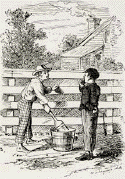Home > Archive > 2009 > July > 7
New rules for the SUL
Tuesday, July 07, 2009 by Dave Winer.
SUL stands for Suggested Users List. ![]()
I've written about it many times here on Scripting News. ![]()
I think it's finally time to say what I would advise Twitter, Inc to do to clean up the mess. Obviously they don't have to do any of this. But maybe it'll do some good to put the ideas out there anyway. ![]()
 1. The max period anyone can be on the list is 30 days. Estimate how many followers each person currently on the list had been given, prorate it, and adjust it down to 30 days worth. So if on average, over the last few months, a member of the list would have gotten 100K new followers, but actually received 800K, he or she would lose 700K followers. It's still a gift of 100K followers, nothing to sneeze at. (And if it's true, as Tim O'Reilly says, that they don't matter, then losing some is nothing to complain about.)
1. The max period anyone can be on the list is 30 days. Estimate how many followers each person currently on the list had been given, prorate it, and adjust it down to 30 days worth. So if on average, over the last few months, a member of the list would have gotten 100K new followers, but actually received 800K, he or she would lose 700K followers. It's still a gift of 100K followers, nothing to sneeze at. (And if it's true, as Tim O'Reilly says, that they don't matter, then losing some is nothing to complain about.) ![]()
2. It's possible that publications receiving the SUL bounty, such as TechCrunch, Mashable, GigaOm and ReadWriteWeb, may have been witholding criticism of Twitter. They would now be free to express it. So there may be a bunch of bad press about this. Take the hit now while you're on top. Spin it as proof that unwinding the list was a good idea, because every company needs vibrant and unconflicted critics. Thank them for their feedback and take their advice to heart. ![]()
3. Sign a 180-day contract with Mr Tweet to manage the new SUL for $0. If they have a competitor, give them the next 180-day period. Allocate this on a rotating basis. It may be possible at some point for this contract to generate revenue for Twitter, Inc, as long as they keep the choice of people on the list an arm's length matter. ![]()
 4. It may also be possible to do away with the list entirely, to suggest people to follow based on who they already know. Offer another route into the system, at the recommendation of an existing user. Then you have their network to base suggestions on. The incentives are lined up well for that, it encourages people to find new users and to have them encourage them to actually engage with the network. If the people you're following initially are friends, family members, neighbors, co-workers, the experience will mean more. Nothing wrong with following celebrities too, of course.
4. It may also be possible to do away with the list entirely, to suggest people to follow based on who they already know. Offer another route into the system, at the recommendation of an existing user. Then you have their network to base suggestions on. The incentives are lined up well for that, it encourages people to find new users and to have them encourage them to actually engage with the network. If the people you're following initially are friends, family members, neighbors, co-workers, the experience will mean more. Nothing wrong with following celebrities too, of course. ![]()
5. No more random selections for the SUL by TwitterCorp employees. This is a very bad practice for many reasons. ![]()
Jay and I discussed this in yesterday's Rebooting the News podcast. Clearly "real-time search" will require something like Page Rank in Google search, a way to determine the authority or relevance of a tweet or a link in a tweet. Microsoft has already encountered this issue when trying to develop real-time search in their Bing search engine. ![]()
While follower-count isn't perfect, it's the only metric we have anywhere in sight that might support relevance in search. Before the SUL it was actually working fairly well, but the SUL introduced a huge distortion. It may not be too late to unwind this and to solve the problem they were trying to solve without losing follower-count as a meaningful metric. ![]()
Recent stories
 Dave Winer, 54, pioneered the development of weblogs, syndication (RSS), podcasting, outlining, and web content management software; former contributing editor at Wired Magazine, research fellow at Harvard Law School, entrepreneur, and investor in web media companies. A native New Yorker, he received a Master's in Computer Science from the University of Wisconsin, a Bachelor's in Mathematics from Tulane University and currently lives in Berkeley, California.
Dave Winer, 54, pioneered the development of weblogs, syndication (RSS), podcasting, outlining, and web content management software; former contributing editor at Wired Magazine, research fellow at Harvard Law School, entrepreneur, and investor in web media companies. A native New Yorker, he received a Master's in Computer Science from the University of Wisconsin, a Bachelor's in Mathematics from Tulane University and currently lives in Berkeley, California.
"The protoblogger." - NY Times.
"The father of modern-day content distribution." - PC World.
One of BusinessWeek's 25 Most Influential People on the Web.
"Helped popularize blogging, podcasting and RSS." - Time.
"The father of blogging and RSS." - BBC.
"RSS was born in 1997 out of the confluence of Dave Winer's 'Really Simple Syndication' technology, used to push out blog updates, and Netscape's 'Rich Site Summary', which allowed users to create custom Netscape home pages with regularly updated data flows." - Tim O'Reilly.
Dave Winer
© Copyright 1994-2009 Dave Winer
Last update: 7/7/2009; 3:45:31 PM Pacific. "It's even worse than it appears."